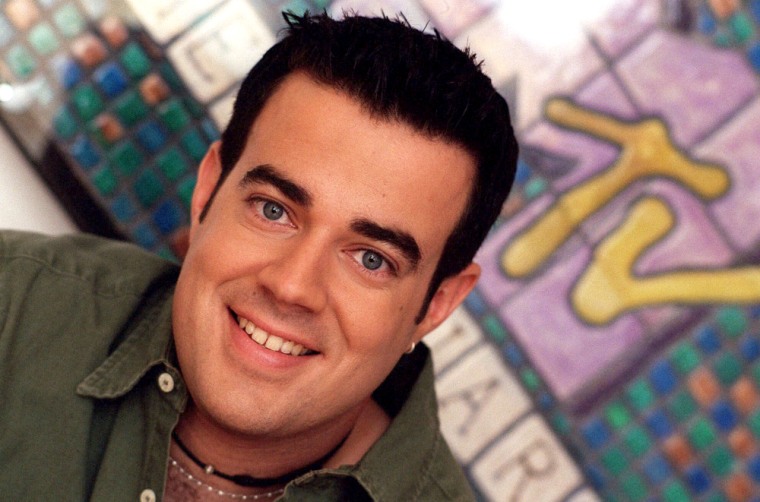Four years ago he stood at the center of the teen universe, a genial Dick Clark for the Britney Spears generation. As host of MTV's daily afternoon celebfest, TRL, Carson Daly made himself an overnight star, gracing teenzine covers and dating starlets. Now teen pop is passé, and he rarely appears on MTV, let alone in Tiger Beat. But Daly, 30, has parlayed fleeting fame into recurring revenue. Through a nationally syndicated radio show and a late-night talk show on NBC, he reaches more people than he ever did at MTV. This year he should make $7 million — more than triple the $2 million he got at his peak as a pop idol.
"My priorities have completely shifted gears on that whole notion of 15 minutes of fame," he says. "Being a workaholic is my defense against losing the good life."
Daly grew up in a modest neighborhood in Palm Springs, Calif., but tasted success early on. After a year on a golf scholarship at Loyola Marymount University, he left in 1993 to intern at a Palm Springs radio station. (His then-boss, Jimmy Kimmel, is now his late-night rival.) Three years later, at age 23, Daly landed an on-air job at KROQ, an influential outlet in Los Angeles. In 1997 he began moonlighting at MTV, appearing on air for an extra $600 a day; that fall he quit the KROQ job to join MTV full-time, grabbing a one-year, $100,000 contract. By 1998 Daly was on TRL (Total Request Live), filmed live at MTV's Times Square studio, playing host to Kid Rock, the Backstreet Boys and other artists who were just heating up, and becoming a household name (among the junior-high set) himself.
But how to survive after the buzz died down? Daly quickly capitalized on his fame, persuading MTV, notorious for paying its talent little and replacing it frequently, to lock in guaranteed compensation starting in 1999. By year-end 2005 he will have earned $8 million from the cable channel, even though he stopped hosting TRL in 2003. But he resisted multimillion-dollar offers from the big broadcast networks to do another TRL. "Everybody was coming to me trying to do a big, blown-out version of TRL, network style. I just couldn't do that. It was time to reinvent."
So in 2001 he signed a five-year deal with Premier Radio Networks to host Carson Daly's Most Requested. Daly tapes multiple versions of his daily one-hour show from 8 a.m. to 10 a.m. each morning in his apartment in New York City, reading from a script, ad-libbing and throwing in geographically specific sound bites for nine major markets. In Los Angeles his between-song banter may praise the Lakers; in New York he commiserates about the Knicks. Daly's producers then lace his tracks into each city's daily hit list, running the show at 6 p.m. in local markets. He reaches 5 million listeners on 130 stations every weekday, 4.3 million more than his peak audience at MTV. The pay is good: a salary that starts at $1 million, plus half the show's profits. This year Daly will make $2 million.
Further expanding his base, Daly in late 2001 took on a late-night talk show, occupying the 1:30 a.m. time slot on NBC. "I had no idea what I was doing. There was a huge learning curve." But this year he earned a three-year renewal of Last Call with Carson Daly that bumps his annual salary up 50 percent, to $1.5 million; this year he will also host NBC's New Year's Eve coverage. "He's plugged in to what's happening in popular culture," and older viewers "look to him to find out what their kids are up to," says Jeffrey Zucker, president of NBC Universal Television Group.
Daly, who idolizes celebrity entrepreneurs like Russell Simmons and Sean (P. Diddy) Combs, also owns a 50 percent stake in a fledgling record company, 456 Entertainment, that to date has signed six groups and released one record (though it has yet to turn a profit). Daly also earns $2 million a year endorsing products like Starburst candy and Cingular cell phones.
Though he isn't quite the red-hot franchise he was when TRL popped, Daly still gets mobbed by admirers. He takes an SUV for three-block trips through Manhattan rather than attract too much attention. To prove his point he pulls his ever-present baseball cap low over his eyes, walks into Times Square — and is promptly accosted by a gaggle of giggling teenage girls. Fame, even after that first buzz fades, is still pretty good, Daly admits. It's just not the goal in itself: "I always want to be in front of the camera. But more importantly, I want to run my business."
